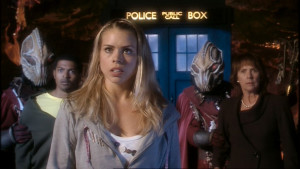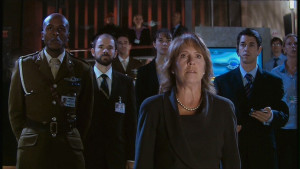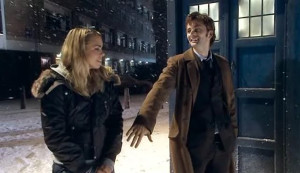Season 2 opens with the TARDIS crash-landing in Cardiff to the horror of Jackie Tyler and Mickey Smith. Out of it stumbles an unfamiliar and incoherent man wearing the familiar black trousers, knitted v-neck and leather jumper of the Doctor. With a big smile, he wishes Jackie and Mickey a merry Christmas, then collapses. Rose emerges from the TARDIS, solemn, pale, looking lost.
Mickey: “But who is he? Where’s the Doctor?”
Rose: “That’s him, right in front of you. That’s the Doctor.”
Jackie: “What do you mean ‘that’s the Doctor’? Doctor who?!”
The Doctor died. Or didn’t I mention?
It’s a shock to lose the brave, goofy, snippy, enigmatic, brilliant man we’ve come to know and love as the Doctor. Welcome to the concept of regeneration: the method by which Time Lords “cheat death.” By Doctor Who lore, each Time Lord gets 12 regenerations—a kind of reincarnation, but only into another humanoid form. Though their face, body, and personality shift (sometimes drastically), they retain the memories, knowledge, history, and experience of their former self. As of the 2005 reboot, this particular Time Lord (our Doctor) has regenerated 9 times—this is his 10th. I could go on and on about the creative brilliance of this storytelling device, but this episode is not about what regeneration does for the Doctor. It’s about its effect on those he “leaves behind”—mere mortals for whom one face, one life, is the limit.
 Rose is, as per usual, the viewer’s perspective in the story. Through her, we experience the disorientation of watching your best friend die, yet not really losing them. To top it off, this particular regeneration process leaves the Doctor incapacitated. Meanwhile, the Earth is invaded by aliens called the Sycorax, who manipulate 1/3 of the world’s population atop buildings and high-rises, and threaten to make them jump if Earth doesn’t surrender half its population as slaves. If ever the planet, or Rose, needed the Doctor, it is now. And yet, he is lying in bed, unconscious, in striped pajamas and a bathrobe. Hardly the hero everyone needs.
Rose is, as per usual, the viewer’s perspective in the story. Through her, we experience the disorientation of watching your best friend die, yet not really losing them. To top it off, this particular regeneration process leaves the Doctor incapacitated. Meanwhile, the Earth is invaded by aliens called the Sycorax, who manipulate 1/3 of the world’s population atop buildings and high-rises, and threaten to make them jump if Earth doesn’t surrender half its population as slaves. If ever the planet, or Rose, needed the Doctor, it is now. And yet, he is lying in bed, unconscious, in striped pajamas and a bathrobe. Hardly the hero everyone needs.
The first half of the episode, Rose watches what is happening like everyone else–powerless to intervene for the world. She is in mourning for her friend the Doctor, and feels abandoned. She whispers in the Doctor’s ear: “come back, we need you!” She cries in her mother’s arms: “he left me!”
Rose desperately, earnestly seeks answers in the face of uncertainty but gets only silence in return. Sound familiar? There are many Biblical characters that could relate to this kind of experience–perhaps none more than Job, who spends a significant portion of his life in mourning and asking God “why?”, only to never have that question answered.
Our souls find it difficult to reconcile the harsh aspects of our world with the character of a God who promises he will “never leave you nor forsake you” (Deuteronomy 31:6), that “all things work together for good” (Romans 8:28), and that he has plans to give us “a future and a hope” (Jeremiah 29:11). Face-to-face with tragedy and the apparent silence of God, we often either withdraw entirely or take matters into our own hands. Both reactions have a smiliar working theory: “I am on my own.”
We see both reactions from Rose in this Christmas episode. Running away does her no good, as it actually leads her further into the problem: she is teleported in the TARDIS aboard the Sycorax’ ship. Once facing the alien threat, she shifts gears, trying to take the problem head-on by stepping into the shoes of the Doctor and imitating him as Earth’s representative:
Rose: “Somebody’s got to be the Doctor.”
Harriet: “They’ll kill you.”
Rose: “Never stopped him.”
Rose’s brave attempt to “be the Doctor,” speaking in the language of the wider universe, comes off instead like the babbling of a child. The Sycorax laugh at her and her “stolen words.” As the hero, she is completely ineffective, lacking the power and skill to perform what the role requires.
 The world is full of the inexplicable that we simply are not powerful enough to do anything about: we need something bigger than ourselves. God, our Champion, may be unpredictable and mysterious; we may doubt his power, even his existence, but we cannot deny that human beings have serious limitations when it comes to taking on the role of the highest power.
The world is full of the inexplicable that we simply are not powerful enough to do anything about: we need something bigger than ourselves. God, our Champion, may be unpredictable and mysterious; we may doubt his power, even his existence, but we cannot deny that human beings have serious limitations when it comes to taking on the role of the highest power.
It is difficult to wait on the intervention of One who can change our circumstances but often does in ways we did not expect, imagine, or desire. However, we have been given the promise that his ways are just, good, and true. That they are done out of love for us. 2 Corinthians 6 says that we are not in fact alone, but have been adopted into God’s family. As heirs connected to the Father, we receive all the victory, life, and power of our Heavenly source, and nothing can ultimately overcome us–no painful situation, not even torture or death.
The Doctor shows up in time to save the day. Despite his new visage, we are at last exposed to a familiar bravery, cleverness, fierceness, and cheek that makes Rose (and all of us) breathe a sigh of relief: He’s back.
Sycorax Leader: “You stand as this world’s champion?”
Doctor: “Thank you! I have no idea who I am, but you’ve just summed me up.”
The hero returns. The world is saved. Yet, in many ways this story doesn’t have a happy ending. When the Doctor lets the Sycorax go on the promise that they will not return, fear causes Prime Minister Harriet Jones to take matters into her own hands: she has the aliens executed. Even after witnessing God’s power in our circumstances, it’s our nature to slip back into that old way of thinking when faced with new pains or fears: “we must protect ourselves; we’re on our own”.
Hard scenarios in our lives often don’t have the happy endings we desire. Understandably, our instincts cause us to try to be our own heroes, time and again. We are afraid to trust in a Champion other than ourselves–will he always be there when we need him? Harriet Jones is right: people die, bad things happen. Furthermore, God does not always give us that for which we pray. These are certainly hard realities to consider. While on the surface, it may look like we are getting by well and good on our own, we will ultimately come face-to-face with those harsh life circumstances in which our powerlessness is a crushing, undeniable truth.
There is another truth worth clinging to with all the hope and trust we can muster: We don’t just have A hero, we have The Hero, who created the world and continues to sustain it (Acts 17: 28). We will not always understand what, why, or how our Hero works, but Victory over the pain and evil of this world is promised to us. We’re not asked to be our own hero, but we’re not asked to be passive, either. If we fight under His banner with perseverance and trust, his Victory is ours.
 We are not alone.
We are not alone.
“I don’t think the way you think.
The way you work isn’t the way I work.”
God’s Decree.
“For as the sky soars high above earth,
so the way I work surpasses the way you work,
and the way I think is beyond the way you think.
Just as rain and snow descend from the skies
and don’t go back until they’ve watered the earth,
Doing their work of making things grow and blossom,
producing seed for farmers and food for the hungry,
So will the words that come out of my mouth
not come back empty-handed.
They’ll do the work I sent them to do,
they’ll complete the assignment I gave them.
“So you’ll go out in joy,
you’ll be led into a whole and complete life.
The mountains and hills will lead the parade,
bursting with song.
All the trees of the forest will join the procession,
exuberant with applause.
No more thistles, but giant sequoias,
no more thorn-bushes, but stately pines—
Monuments to me, to God,
living and lasting evidence of God.”
–Isaiah 55: 8-13

